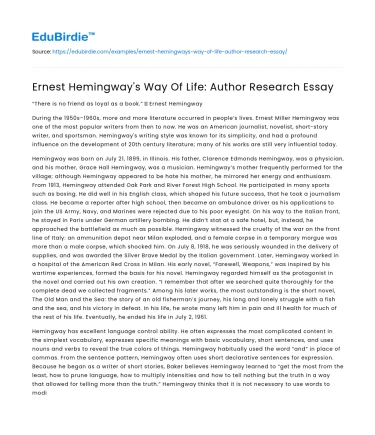Introduction
Ernest Hemingway, an iconic figure in American literature, is renowned not only for his distinctive writing style but also for his adventurous and often tumultuous way of life. His experiences as a journalist, a war correspondent, a sportsman, and a traveler influenced his narratives, characters, and themes profoundly. Hemingway's lifestyle, marked by a pursuit of excitement and a stoic acceptance of life's hardships, is reflected in his literary creations. As noted by biographer Carlos Baker, Hemingway's life and his fiction are inextricably intertwined, with his personal philosophy often mirroring the existential themes explored in his novels (Baker, 1969). This essay examines how Hemingway's way of life shaped his literary output, focusing on his experiences in war, his adventurous spirit, and his complex personal relationships. By exploring these aspects, the essay seeks to understand the extent to which Hemingway's personal experiences informed his narrative style and thematic preoccupations.
Hemingway's War Experiences
Ernest Hemingway's experiences in the theater of war significantly influenced his writing, providing a backdrop for many of his works. As a young man, Hemingway volunteered as an ambulance driver during World War I, where he sustained severe injuries. This experience formed the basis of his novel "A Farewell to Arms," which vividly captures the futility and devastation of war. Hemingway's firsthand encounters with the horrors of conflict imbued his writing with a sense of authenticity and realism. According to literary critic Harold Bloom, Hemingway's portrayal of war's brutal reality distinguished his work from his contemporaries, offering a raw and unflinching perspective that resonated with readers (Bloom, 1985). Moreover, Hemingway's time as a war correspondent during the Spanish Civil War and World War II further deepened his understanding of human conflict, as reflected in works like "For Whom the Bell Tolls." His depiction of war is not merely a setting but a catalyst for exploring themes of courage, loss, and survival.
Save your time!
We can take care of your essay
- Proper editing and formatting
- Free revision, title page, and bibliography
- Flexible prices and money-back guarantee
Despite his apparent glorification of war, Hemingway's narratives also reveal an underlying critique of its senselessness and the psychological scars it leaves on individuals. This duality is evident in his characters, who often grapple with existential dilemmas and the search for meaning in a chaotic world. Hemingway's ability to convey the complexities of war through his minimalist prose is a testament to his literary prowess and his profound understanding of human nature. Thus, his war experiences not only provided material for his stories but also shaped his thematic exploration of the human condition.
Adventurous Spirit and Pursuit of Thrills
Hemingway's adventurous spirit and love for thrill-seeking activities are well-documented, and these pursuits significantly influenced his literary themes and characterizations. From big-game hunting in Africa to deep-sea fishing in the Gulf Stream, Hemingway's appetite for adventure was insatiable. These experiences were vividly captured in works such as "The Green Hills of Africa" and "The Old Man and the Sea," where the challenges and triumphs of man against nature are central. Hemingway's portrayal of these adventures reflects his belief in the "Hemingway code hero," a character archetype exemplified by grace under pressure, resilience, and an unyielding pursuit of personal valor.
Hemingway's immersion in nature and his encounters with the wild also informed his narrative style, characterized by precision, economy, and a deep reverence for the natural world. Critics such as Kenneth Lynn have argued that Hemingway's adventurous lifestyle was a means of escaping the banalities of modern existence, allowing him to explore existential themes of isolation and the struggle for authenticity (Lynn, 1987). However, some detractors suggest that Hemingway's pursuit of danger was driven by a need to prove his masculinity, reflecting a more complex and perhaps troubled aspect of his personality. Despite these criticisms, Hemingway's adventurous life undeniably enriched his literary creations, providing a rich tapestry of experiences that enhanced the depth and authenticity of his narratives.
Complex Personal Relationships
Ernest Hemingway's personal relationships were as tumultuous and complex as his literary endeavors. His four marriages and numerous romantic entanglements provided a wealth of material for his exploration of love, betrayal, and loss. Hemingway's female characters, often modeled after the women in his life, reveal his ambivalent attitude toward relationships. In novels such as "The Sun Also Rises" and "A Farewell to Arms," Hemingway explores themes of unattainable love and the emotional scars left by broken relationships, reflecting his own experiences and insecurities.
Despite his often turbulent relationships, Hemingway's interactions with women were integral to his understanding of human connection and emotional vulnerability. Biographer Mary Dearborn suggests that Hemingway's complex relationship with his mother and his subsequent romantic entanglements influenced his portrayal of women as both nurturing and destructive forces (Dearborn, 2017). This duality is evident in his writing, where female characters often embody both strength and fragility, mirroring Hemingway's conflicted perceptions. While some critics argue that Hemingway's portrayal of women is reductive and misogynistic, others contend that it reflects a genuine attempt to grapple with the complexities of love and companionship.
Conclusion
In conclusion, Ernest Hemingway's way of life profoundly influenced his literary output, with his experiences in war, his adventurous pursuits, and his complex personal relationships serving as rich sources of inspiration. Hemingway's ability to translate his lived experiences into compelling narratives is a testament to his skill as a writer and his deep understanding of the human condition. While his lifestyle choices and attitudes have been the subject of both admiration and criticism, there is no denying the impact they had on his work. Hemingway's legacy endures not only through his contributions to literature but also through the indelible mark his life left on his writing. As we continue to explore Hemingway's oeuvre, it becomes increasingly clear that his way of life and his literary creations are inseparable, each illuminating the other in meaningful and profound ways.






 Stuck on your essay?
Stuck on your essay?

